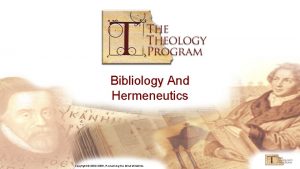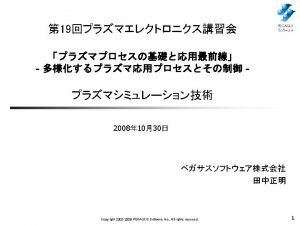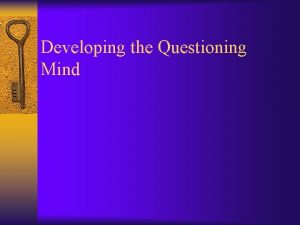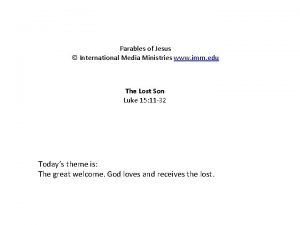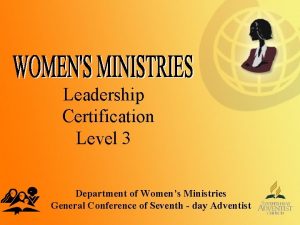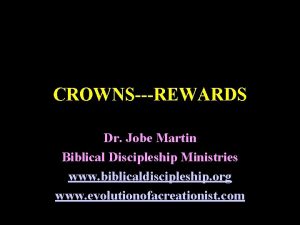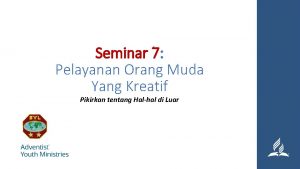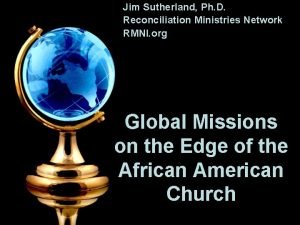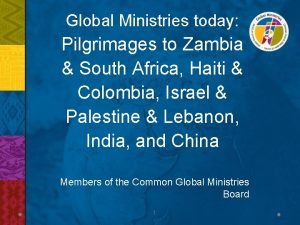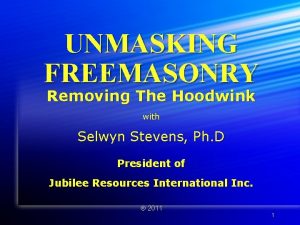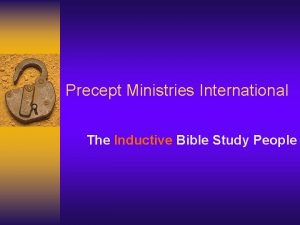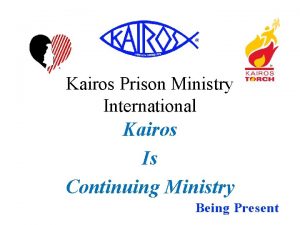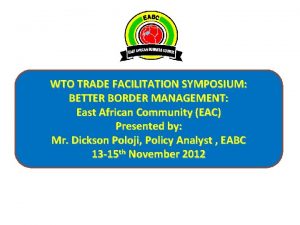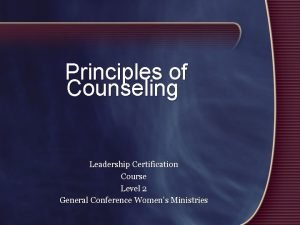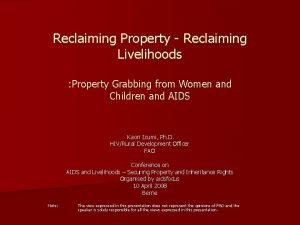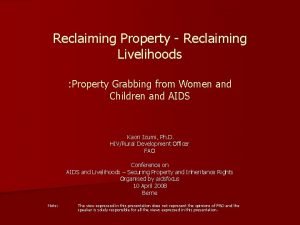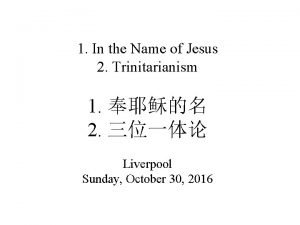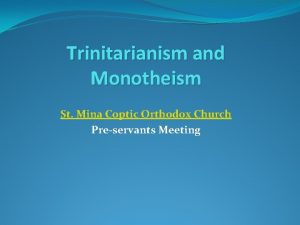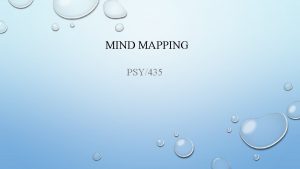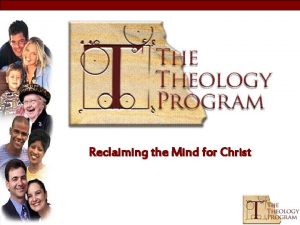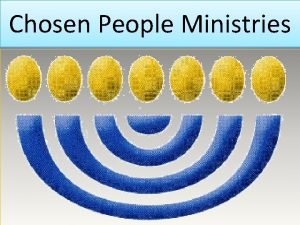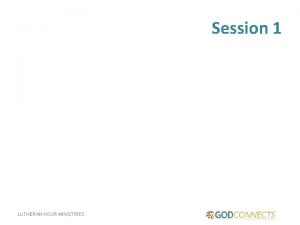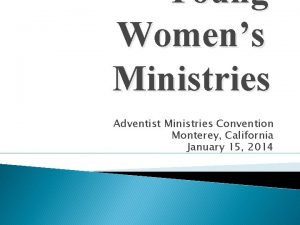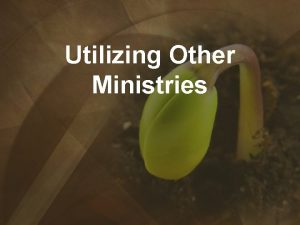Trinitarianism Copyright 2002 2006 Reclaiming the Mind Ministries














































- Slides: 46

Trinitarianism © Copyright 2002 -2006, Reclaiming the Mind Ministries.

“He who is the blessed and only Sovereign, the King of kings and Lord of lords, who alone possesses immortality and dwells in unapproachable light, whom no man has seen or can see. To Him be honor and eternal dominion! Amen. ” – 1 Timothy 6: 15 -16 © Copyright 2002 -2006, Reclaiming the Mind Ministries.

Course Outline I. III. IV. V. VIII. IX. X. Worldviews The Knowability of God Arguments for God’s Existence The Incommunicable Attributes of God (1) The Incommunicable Attributes of God (2) The Communicable Attributes of God The Doctrine of the Trinity: Historical Development The Doctrine of the Trinity: Biblical Defense Christology: The Humanity of Christ in History Christology: The Humanity of Christ in the Bible © Copyright 2002 -2006, Reclaiming the Mind Ministries.

Modalism Trinity Incarnation Sovereignty Pluralism Transcendence Virgin Birth Apollinarianism Nestorianism Kalam Truth Ontological Grace Omnipresence Arianism Worldviews Kenosis Open Theology Hypostatic Union © Copyright 2002 -2006, Reclaiming the Mind Ministries.

Trinitarianism “The doctrine of God is the central point for much of the rest of theology. One’s view of God might even be thought of as supplying the whole framework within which one’s theology is constructed, life is lived, and ministry is conducted. ” —Millard Erickson, Christian Theology (Grand Rapids, MI: Baker, 2001), 290 © Copyright 2002 -2006, Reclaiming the Mind Ministries.

Session 1 Worldviews What kind of sunglasses do you wear? © Copyright 2002 -2006, Reclaiming the Mind Ministries.

Question What is a worldview? © Copyright 2002 -2006, Reclaiming the Mind Ministries.

Worldviews “How one interprets reality. ” — Norman Geisler Baker Dictionary of Christian Apologetics (Grand Rapids, MI: Baker, 1999), 785 “An ordered set of propositions that one believes, especially propositions about life’s most important questions. ” — J. P. Moreland & William Lane Craig Philosophical Foundations for a Christian Worldview (Downers Grove, IL: IVP, 2003), 13 © Copyright 2002 -2006, Reclaiming the Mind Ministries.

Worldviews “The sum total of a person’s answers to the most important questions in life. ” — Ronald Nash Life’s Ultimate Questions (Grand Rapids, MI: Zondervan, 1999), 392 “A worldview is a set of presuppositions (or assumptions) which we hold (consciously or subconsciously) about the basic makeup of our world. ” — James Sire The Universe Next Door (Downers Grove, IL: IVP, 1988), 17 © Copyright 2002 -2006, Reclaiming the Mind Ministries.

Worldviews Worldview: © Copyright 2002 -2006, Reclaiming the Mind Ministries. The sum total of a person’s answers to the most important questions in life.

Question What are the types of worldview questions? © Copyright 2002 -2006, Reclaiming the Mind Ministries.

Worldviews Types of questions that make up worldview: 1. Metaphysical 2. Theological 3. Epistemological 4. Ethical 5. Anthropological © Copyright 2002 -2006, Reclaiming the Mind Ministries. a

Worldviews Metaphysical 1. Is there something? 2. Why is there something rather than nothing? © Copyright 2002 -2006, Reclaiming the Mind Ministries.

Worldviews Theological 1. Is there a God? 2. Who or what is God? 3. What is his relationship to the universe? © Copyright 2002 -2006, Reclaiming the Mind Ministries.

Worldviews Epistemological 1. What is truth? 2. Can truth be known? 3. How is knowledge attained? © Copyright 2002 -2006, Reclaiming the Mind Ministries.

Worldviews Ethical 1. Are there moral laws? 2. What is the basis for moral laws? 3. Do laws apply to all people? © Copyright 2002 -2006, Reclaiming the Mind Ministries.

Worldviews Anthropological 1. What is man? 2. Are human actions free or determined? 3. Is man essentially good, evil, or neutral? 4. What happens after death? © Copyright 2002 -2006, Reclaiming the Mind Ministries.

Question What are the seven basic worldviews? © Copyright 2002 -2006, Reclaiming the Mind Ministries.

Worldviews Seven basic worldviews: 1. Theism 2. Deism 3. Pantheism 4. Panentheism 5. Polytheism 6. Naturalism 7. Pluralism © Copyright 2002 -2006, Reclaiming the Mind Ministries.

Worldviews Theism: Adherents: Theistic worldview that believes an eternal God freely created all of existence (time, space, matter, celestial realms and bodies) out of nothing (ex nihilo) and that He continues to act within the creation in varying degrees. Judaism, Christianity, and Islam © Copyright 2002 -2006, Reclaiming the Mind Ministries.

Timeless Eternity God (ontos) Transcendence Creation ex nihilo Time-bound Eternity God Immanence Heaven Man New Heaven and New Earth Every Created Thing © Copyright 2002 -2006, Reclaiming the Mind Ministries. Angels

Worldviews Metaphysical: There is something, and an infinite Creator is responsible for creating all that there is. He is completely separate from creation and created it out of His own good pleasure, not out of necessity. Theological: God is the Creator of the universe and He exists beyond it and He acts within it. Epistemological: Truth is absolute, has its ground in God, and is acquired primarily through general and special revelation. Ethical: Moral laws do exist and apply to all people of all times, having their basis in God. Anthropological: Man is created in the image of God and finds his dignity in this image. © Copyright 2002 -2006, Reclaiming the Mind Ministries.

Worldviews Deism: Theistic worldview that believes God created the universe, but has not been involved in it since. Adherents: Voltaire, Thomas Jefferson, Thomas Paine, Theistic Evolutionists (though not all) © Copyright 2002 -2006, Reclaiming the Mind Ministries.

Timeless Eternity God Transcendence Creation ex nihilo Time-bound Eternity Every Created Thing © Copyright 2002 -2006, Reclaiming the Mind Ministries.

Worldviews Metaphysical: There is something and an infinite Creator is responsible for creating all that there is. Theological: God is the creator of the universe and He exists beyond but does not concern himself with it any longer. Epistemological: Truth is absolute, has its ground in God, and is acquired primarily through general revelation. Ethical: Moral laws do exist and apply to all people of all times having their basis in nature. Anthropological: Man is created neutral, neither good nor evil, and gains dignity through his actions. His eternal destiny is determined by his actions. © Copyright 2002 -2006, Reclaiming the Mind Ministries.

Worldviews Pantheism: Lit. pan “all” theism “god. ” Theistic worldview that believes God is identical with the universe. Adherents: Hindus, Zen Buddhists, Christian Scientists, Spinoza © Copyright 2002 -2006, Reclaiming the Mind Ministries.

Time-bound Eternity God Immanence Every Created Thing © Copyright 2002 -2006, Reclaiming the Mind Ministries.

Worldviews Metaphysical: All is an illusion except the oneness of the Real (God). Theological: All is God and God is all. God is impersonal and immanent, being in no sense transcendent. Epistemological: The only truth is that which is found in the Real and beyond our understanding. Sense, experience and reason are misleading because they are based on illusions. Ethical: Moral laws are part of the illusion of this life and have no basis in the Real. In God, there is neither good nor evil. Anthropological: Man is part of the Real. Self-realization will help one work off bad karma through a process of reincarnation until he unites with the Real in Nirvana, thereby losing any sense of individuality. © Copyright 2002 -2006, Reclaiming the Mind Ministries.

Worldviews Panentheism: Lit. pan “all” en “in” theism “god. ” Theistic worldview that believes the universe is a part of who God is, but is not all that God is. Adherents: Charles Harthstone, Alfred North Whitehead, Process Theologians, Open Theists (to a certain degree) © Copyright 2002 -2006, Reclaiming the Mind Ministries.

Timeless Eternity God (ontos) Transcendence Time-bound Eternity God (ontos) Immanence Everything © Copyright 2002 -2006, Reclaiming the Mind Ministries.

Worldviews Metaphysical: There is something and this something, the universe, is a part of God and, therefore, necessarily exists. Theological: God is finite and is undergoing change and development along with the universe. The universe is in God although God is more than the universe. Epistemological: Truth is developing and is acquired primarily through nature. Ethical: Moral laws do not exist, since morals are changing as God is changing. Anthropological: Man is a part of God as cells are a part of the body. Man will live forever as a part of the memory of God. © Copyright 2002 -2006, Reclaiming the Mind Ministries.

Worldviews Polytheism: Adherents: © Copyright 2002 -2006, Reclaiming the Mind Ministries. Lit. poly “many” theism “god. ” Theistic worldview that believes there are many gods. Ancient religions, Hinduism, Zen Buddhists, Mormons

Time-bound Eternity gods Immanence Heaven Man Every Created Thing © Copyright 2002 -2006, Reclaiming the Mind Ministries. Angels

Worldviews Metaphysical: There is something, and it has been for all eternity. Theological: There are many finite gods that are immanent within the universe and are not transcendent above it. Epistemological: Truth is acquired through revelation of the deities and, therefore, it is relative. Ethical: Absolute moral laws do not exist, since they are determined by the individual gods. Anthropological: Man is here for the pleasure of the gods and will attain to an afterlife based upon the amount of pleasure he brings to the gods. © Copyright 2002 -2006, Reclaiming the Mind Ministries.

Worldviews Pluralism: Adherents: © Copyright 2002 -2006, Reclaiming the Mind Ministries. Worldview that believes all beliefs are ultimately true, even if they are contradictory. Postmoderns, liberals, all religions that have adopted a postmodern epistemology, New Age philosophies

Worldviews Naturalism Pantheism Theism God Polytheism Panentheism © Copyright 2002 -2006, Reclaiming the Mind Ministries. Deism

Worldviews Metaphysical: All previous views are correct based on the relative nature of truth. Theological: All views of God are true and describe who He is. Epistemological: Truth is relative. There is no absolute truth and, therefore, no absolute knowledge of truth. Ethical: Absolute moral laws do not exist, since there is no absolute truth. All moral laws are correct for the individual (subjectivism) or culture (relativism). Anthropological: All previous views are correct based upon the relative nature of truth. © Copyright 2002 -2006, Reclaiming the Mind Ministries.

Worldviews Naturalism: Atheistic worldview that believes nature is the sum total of all reality. Adherents: Karl Marx, Friedrich Nietzsche, Sigmund Freud, Bertrand Russell © Copyright 2002 -2006, Reclaiming the Mind Ministries.

Time-bound Eternity Everything © Copyright 2002 -2006, Reclaiming the Mind Ministries.

Worldviews Metaphysical: There is something and it has eternally existed, always obeying the laws of nature. Theological: There is no God. Epistemological: Some truth is objective, namely that which is found in the eternal laws of nature. Ethical: Moral laws do not exist, since this would require a moral law-giver. Anthropological: Man is a meaningless result of chance, brought about by cause and effect of the natural order, with no ultimate purpose to his existence. © Copyright 2002 -2006, Reclaiming the Mind Ministries.

Worldviews Naturalism Deism Atheism Nihilism Theologically: Believes in God Practically: Believes there is purpose Theologically: Does not believe in God Practically: Believes there is some purpose. Theologically: Does not believe in God Practically: Believes in no purpose Some hope in God Some hope in man Utter Despair © Copyright 2002 -2006, Reclaiming the Mind Ministries.

Worldviews God? Yes One or Many? No Naturalism (Atheism) All beliefs are true Pluralism One Immanent or Transcendent? Many Polytheism Transcendent only (Nihilism) Immanent and Transcendent Personal or Impersonal? Immanent only Deism Pantheism © Copyright 2002 -2006, Reclaiming the Mind Ministries. Impersonal Panentheism Theism

Worldviews Pantheis m Panenthei sm Polytheis m There is something, and God created it. All is an illusion other than the oneness of the Real. There is something, and it exists as a necessary part of God. One infinite personal God. One infinite impersonal God is finite and everything is God. Epistemolo gy Absolute truth is based on God and is knowable through special revelation. Absolute truth is based on God and is knowable through nature. Ethical Moral laws are based in God. Anthropologic al Man is created by God and therein finds his purpose, destiny, and dignity. Theism Deism Pluralism Naturalism Metaphysi cs There is something, and God created it. There is something, and it has been here for eternity. All views about metaphysics are true. There is something, and it has existed for eternity. Theology God is finite, changing, and dependent on the universe. Many finite gods. All views about God are true. There is no God. All truth is in God but is not knowable. All truth is changing as God is changing. There is no absolute truth. All views about truth are correct. Absolute truth is knowable through nature. Moral laws are based in God. Moral laws are an illusion. There is no right and wrong. Morals are relative, based upon your god. Morals are relative, based upon culture or preference. There are no moral laws since there is no moral lawgiver. Man is created by God and therein gains his dignity. Man is part of God an ultimately looses all individuality as he unites with God. Man is created by God and gains dignity and purpose through his actions. Man is here for the pleasure of the gods and will attain to an afterlife based upon the amount of pleasure he brings to the All views about man are correct. Man is a meaningless result of chance and has no purpose. © Copyright 2002 -2006, Reclaiming the Mind Ministries.

© 2002, www. adherents. com © Copyright 2002 -2006, Reclaiming the Mind Ministries.

Worldviews Four Worldview tests: 1. Test of Reason 2. Test of Outer Experience 3. Test of Inner Experience 4. Test of Practice © Copyright 2002 -2006, Reclaiming the Mind Ministries.

Discussion Groups © Copyright 2002 -2006, Reclaiming the Mind Ministries.
 Reclaiming the mind ministries
Reclaiming the mind ministries Fundamentals of care
Fundamentals of care Copyright 2002
Copyright 2002 Copyright 2002
Copyright 2002 Copyright 2006
Copyright 2006 Copyright 2006
Copyright 2006 Mindmaster community
Mindmaster community A wandering mind is an unhappy mind
A wandering mind is an unhappy mind The critical mind is a questioning mind
The critical mind is a questioning mind International media ministries
International media ministries Women's ministries leadership certification program
Women's ministries leadership certification program Pastor steven khoury
Pastor steven khoury Crown financial money map
Crown financial money map Jobe martin
Jobe martin Adventist recovery ministries
Adventist recovery ministries Tema seminar yang menarik untuk anak muda
Tema seminar yang menarik untuk anak muda Reconciliation ministries
Reconciliation ministries Global ministries hq
Global ministries hq Board of global ministries
Board of global ministries Beadisciple com lay servant ministries
Beadisciple com lay servant ministries The third day of creation
The third day of creation Selwyn stevens jubilee ministries
Selwyn stevens jubilee ministries Personal ministries strategic plan
Personal ministries strategic plan Precept org how to mark key words in your bible
Precept org how to mark key words in your bible Presence ministries
Presence ministries Stonecroft ministries statement of faith
Stonecroft ministries statement of faith Sheepfold ministries
Sheepfold ministries Kairos ministries international
Kairos ministries international Family life ministries themes
Family life ministries themes Lovin life ministry
Lovin life ministry Shantha ready alonso
Shantha ready alonso New heart music ministries
New heart music ministries Eabc ministries
Eabc ministries The fold family ministries
The fold family ministries Seekers of yahweh ministries
Seekers of yahweh ministries Eagle worldwide ministries
Eagle worldwide ministries Women's ministries leadership certification program level 2
Women's ministries leadership certification program level 2 Sabbath school evangelism promotional talk
Sabbath school evangelism promotional talk North point ministries resources
North point ministries resources Luke 9:23 ministries
Luke 9:23 ministries Chụp phim tư thế worms-breton
Chụp phim tư thế worms-breton Bổ thể
Bổ thể Tư thế ngồi viết
Tư thế ngồi viết ưu thế lai là gì
ưu thế lai là gì Thẻ vin
Thẻ vin Thơ thất ngôn tứ tuyệt đường luật
Thơ thất ngôn tứ tuyệt đường luật Các châu lục và đại dương trên thế giới
Các châu lục và đại dương trên thế giới
